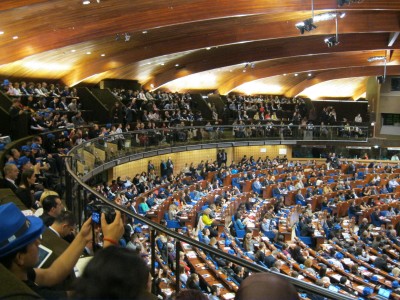
Opening Session, November 3, 2014. Photo via Suzanne Lehn.
The third annual World Forum for Democracy [1] took place earlier this month in Strasbourg, France, where the Council of Europe hosted. The gathering's theme this year was “From Participation to Influence: Can Young People Revitalize Democracy?” For the first nine days of November, moreover, several venues throughout the city welcomed the public for various side events and meetings addressing broader civic engagement issues. Three Global Voices contributors attended, and below you'll find a summary of their impressions, with some photographs, too.
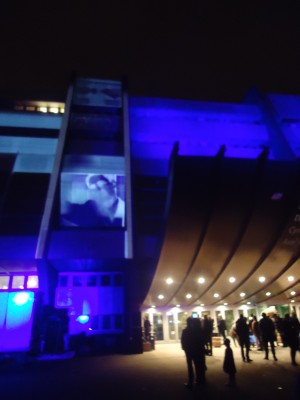
Palace of Europe lit up by Ososphère. Photo by GV member Marie Bohner.
Preliminary note: What exactly is the Council of Europe? (Not to be confused with the European Union.)
The Council of Europe is separate [2] from the EU, though all 28 EU member states are also members of the Council of Europe, which is an intergovernmental organization committed to liberal democracy and political pluralism.
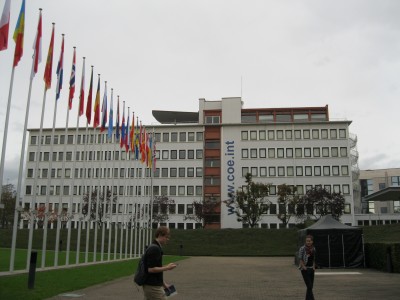
The Council of Europe Facility. Photo by Suzanne Lehn
Here are some basic facts about the Council of Europe:
- There are 47 members, including Russia and the European and Caucasian post-Soviet states (except for Belarus);
- Its Headquarters is in Strasbourg;
- National parliaments appoint the Council's parliament members; and
- It is under the jurisdiction of the European Court of Human Rights, also headquartered in Strasbourg.
The European Union, on the other hand, is
- Composed of 28 members;
- Headquartered in Brussels;
- Its parliament members are directly elected by the citizens of each member state;
- Its sessions are held at Brussels, but it meets once a month in Strasbourg; and
- It is under the jurisdiction of the European Court of Justice, which is headquartered in Luxembourg.
Young People, Front and Center at the 2014 Forum
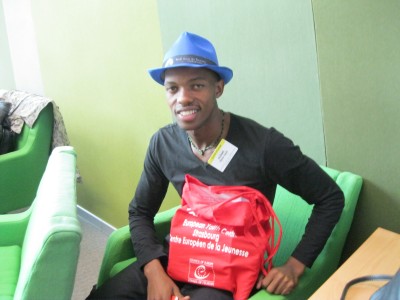
Blue hats are the symbol of engagement for young participants. Photo via Suzanne Lehn
The opening session [3] on Monday, November 3, was an inaugural lecture by social theorist and economist Jeremy Rifkin [4], who emphasized the importance of information technology today, speculating that a new world could emerge from the “third industrial revolution”: a digital, fully interconnected global economy. A new global economy, connected as one single unit, which Rifkin described as “the only hope for reducing the ecological footprint of the human race”.
In an interview (available on YouTube [5]) recorded just before he spoke, the renowned essayist explained his vision and mapped out how young people would live in this new era.
D'ici 2050, le capitalisme va donner naissance à un nouveau système économique, qui sera sa descendance : l'économie du partage sur creative commons. Cette transformation sera rendue possible par de grandes transformations technologiques – communications, énergie et transports, ce que l'on peut appeler le coût marginal zéro.
From now until 2050, capitalism is going to give rise to a new economic system that will be its progeny: the sharing economy and the collaborative commons. This transformation will be made possible by huge technological transformations in communications, energy, and transportation—what can be called zero marginal cost.
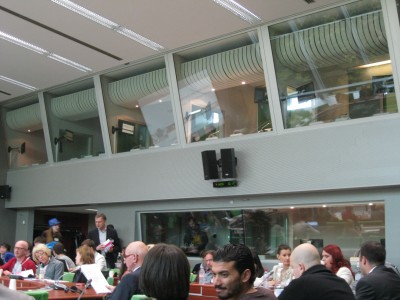
In Session, Lab 7: Artificial intelligence and democracy. Photo by Suzanne Lehn.
The Plenary Session on Tuesday, November 4, was dedicated to 21 “Labs”—roundtable workshops showcasing some 30 innovative projects, selected from 150 proposals. The projects were assessed for potential real-world impact on four criteria: attitudes, decisionmaking, politics, and institutions. From social inclusion to art, from artificial intelligence to participatory democracy at school, from local to global projects, and from social movements to youth parliaments. The Forum's website [6] contains details about all the programs and their participants, and offers full video [7] recaps of every session and workshop.
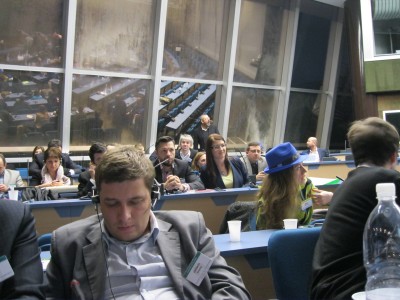
Images of the “unconference” dedicated to “Liberal or Un-Liberal Democracy, or Is There a Third Path?” Photo via Suzanne Lehn.
For the 2014 edition, organizers introduced a new and innovative format. Some “speed-dating” sessions with lab presenters were available, while others could also attend presentations on “democracy prototypes,” “un-conferences,” or “collaborative conferences [8]“. (Preparation for these “un-conferences” began online in early September!) Once underway, they offered opportunities for attendees to speak up and participate spontaneously, whether or not they were engaged in the official sessions. One such “unconference” posed the question, “Is there a place for illiberal democracy?” The session set the stage for some surprisingly rich debates. Marsida Bandilli, who drew from her experience in Albanian politics, broke down the session like this:
La démocratie est définie par les gens, dans chaque pays, c'est un processus, saisi à un certain moment dans le temps. (…) Les tenants de la troisième voie sont des réalistes, ils sont plus ouverts à des définitions alternatives, au lieu d'exclure les démocraties réelles. (…)
Democracy is defined by the people, in each country; it is a process that takes hold at a certain moment in time […]. Those who adhere to the idea of a third path are realistic—they are more open to alternative definitions, instead of excluding true democracies. […]
The Forum and the side events were live-tweeted under the hashtag #CoE_WFD [9], and a dedicated Twitter account, @WFDemocracy, [10]collected all the tweets in real time. Mainstream media coverage, on the other hand, was minimal. Although French newspaper “Le Monde,” a partner of the forum, organized some of the side events, the only substantial mainstream media coverage appeared on the website Mediapart [11], which echoed the conference's call for youth participation.
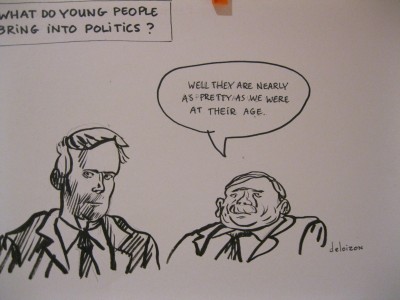
There was a cartoonist for each lab. Above, a humorist take on politics: “What do young people bring into politics?” “Well they are nearly as pretty as we were at their age.” Photo via Suzanne Lehn.
Although participants came from all over the world to debate in a respectful manner, tense subjects like war weren't absent at the forum. In fact, the conference's final presentations made a point of acknowledging these issues.
The next World Forum for Democracy will take place in a year, between November 18 and November 20, 2015. The theme of the 2015 event hasn't yet been decided, but the call for lab candidates will probably be announced soon after New Year's and remain open for several months. This year's invitations for the “unconference” labs, for example, remained option until September. It seems the relatively unstructured formula will return next year, with the “idea machine,” as it's called at the conference, offering up new thoughts and concepts to the Council of Europe.